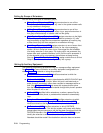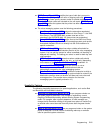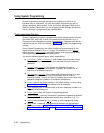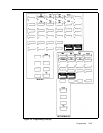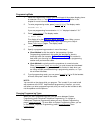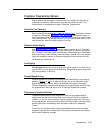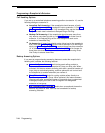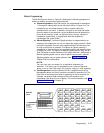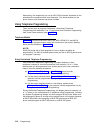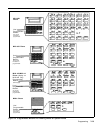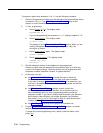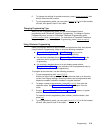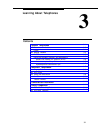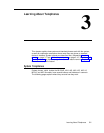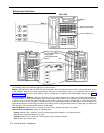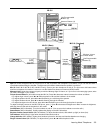
Alternatively, the receptionist can use an MLS-CA24 Intercom Autodialer for the
extensions the receptionist disk most frequently. This leaves buttons on the
phone free for more features and phone numbers.
Using Telephone Programming
There are two ways to program a telephone: Centralized Telephone
Programming from extension 10 or 11 (see below) and Extension Programming
from a user’s own extension (see page 2-21).
Telephone Models
Figure 2-5 illustrates an MLS-34D, MLS-18D, MLS-12D/MLS-12, and MLS-6
phone. As you program buttons, mark their functions on the phone’s labeling
sheet (see the examples in Figure 2-5).
NOTE:
An MLS-6 phone with 4 lines assigned to it has no buttons available for
programming. The MLC-6 cordless phone looks just like an MLS-6 phone when
you program it centrally.
Using Centralized Telephone Programming
Use Centralized Telephone Programming to program features or store
telephone numbers for individual extensions from extension 10 or 11. Most
features also can be programmed on a system phone at the user’s extension.
Keep in mind the following exceptions:
■
■
■
Automatic Line Selection and Line Ringing always must be
programmed using Centralized Telephone Programming.
If a user has a standard phone, Personal Speed Dial Numbers for the
extension can be programmed only by using Centralized Telephone
Programming.
If a user has a standard phone or a non-display system phone,
Extension Name Display for the extension can be programmed only by
using Centralized Telephone Programming.
During Centralized Telephone Programming, the display phone at extension 10
or 11 takes on the characteristics of telephone being programmed, including
any System Programming settings and lines assigned to the phone. Make sure
the programming phone is as large as the largest phone in the system, because
an MLS-18D phone cannot program an MLS-34D phone and an MLS-12D
phone cannot program an MLS-18D phone or an MLS-34D phone.
2-18 Programming



